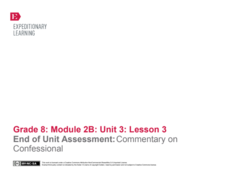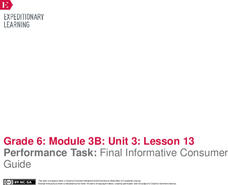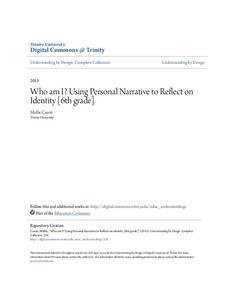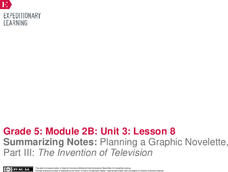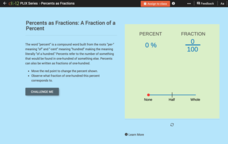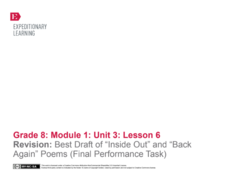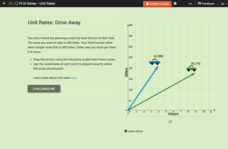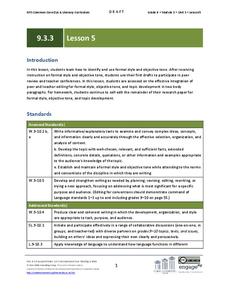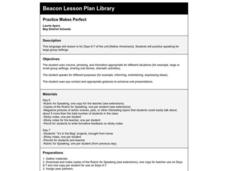Digital Commons
Convince Me! A Persuasive Writing Unit for 2nd Grade
Elementary learners are not often shy about expressing what they want, but they could use a little help organizing their arguments. Help young writers work through a series of persuasive writing exercises that emphasize the importance of...
Curated OER
A Year (a Day or a Week) In My Life as a Shorebird
Young scholars describe the basic life history of one shorebird common to their area. They use the writing process which includes brainstorming, rough draft writing, peer editing, and re-writing to create a factually and grammatically...
EngageNY
Writing, Critique, and Revising: Two-Voice Poems (Chapter 14: "Las Ucas/Grapes")
Continue work on the two-piece poem that compares two characters from Esperanza Rising. Give class members a few minutes to finish their drafts. After they have a complete product, model how to critique and edit the poems with one group....
EngageNY
End of Unit Assessment: Commentary on Confessional
What does commentary have to do with narrative? Before scholars explain the narrative choices in their Character Confessionals, they review provided commentary to explain the score they received on previous assessments. They review...
EngageNY
Final Performance Task: Delivering an Opinion Speech with Multimedia Display
Welcome to the grand finale! Scholars practice reading their speeches to a partner and make last-minute changes based on feedback. Pupils then present their final opinion speeches to their small groups and show off their work in a...
Curated OER
Human Impacts on Sharks: Developing an Essay Through Peer-Review on a Discussion Board
Students develop a paper topic (in this case, the human impacts on sharks) that is peer reviewed by additional students answering guided questions. The original student must respond to the comments by the fellow classmates. All of the...
EngageNY
Performance Task: Final Informative Consumer Guide
Formative feedback should be kind, specific, and helpful. Pupils engage in a peer editing process, using a rubric to critique a partner's writing. Next, scholars use the feedback to create the final version of their informative consumer...
Trinity University
Who Am I? Using Personal Narrative to Reflect on Identity
Who am I? Pupils work to answer this question through a unit that explores personal narratives and identity. Exit tickets for activities that examine different poems, short stories, and autobiographical writing serve as prewriting for...
EngageNY
End of Unit 3 Assessment: Readers Theater Commentary
Prove it! In the end-of-unit assessment, scholars write a commentary and provide evidence to justify the connection between their reader's theater scripts and To Kill A Mockingbird. After completing the assessment, they practice...
EngageNY
Summarizing Notes: Planning a Graphic Novelette, Part III: The Invention of Television
How did the television change people's lives? Learners consider the question as they complete their storyboards about the invention of the TV, adding visual elements along the way. Then, they participate in a peer review to offer and...
CK-12 Foundation
Percents as Fractions: A Fraction of a Percent
Five questions make up an interactive all about percents and fractions. Mathematicians answer multiple-choice and fill in the blank problems with help from a tool that converts percents to fractions using a sliding bar. An open...
EngageNY
Revision: Best Draft of “Inside Out” and “Back Again” Poems (Final Performance Task)
Scholars read their poems to their research teams as their final performance task. The teams listen and give feedback on the flow between the two poems. Writers then take the feedback from their teams and revise their poems before...
CK-12 Foundation
Comparison of Unit Rates: Drive Away
Five questions make up an interactive that challenges mathematicians to compare unit rates. Word problems question scholars about two friends going on a road trip. Scholars manipulate two cars on a coordinate plane to help solve word...
K20 LEARN
The K20 Chronicle, Lesson 2: How To Conduct An Interview
Young journalists learn how to prepare for an interview, conduct an interview, and craft good interview questions with follow-up questions. After they watch and analyze several interviews, class members select a senior to interview,...
K20 LEARN
Trigger Warnings - Intellectual Rights and Responsibilities: Banned Books, Censorship Part 1
"Warning: Conducting this lesson may be harmful." Such statements, called "Trigger Warnings," are the focus of a two-part lesson that looks at censorship, especially the pros and cons of trigger warnings. Class members read two articles,...
EngageNY
Performance Task: Final Draft of the Newspaper Article
It's time for the grand finale! Scholars complete the final draft of their newspaper articles for the End of Unit 3 Assessment. They share their article with a classmate for peer critique. After considering all feedback and including a...
EngageNY
Writing an Argument Essay: Gathering Evidence
Writers work on a plan for their argumentative essays using a Pygmalion Essay Planner to help develop a claim and counterclaim for their essays. They determine what information from the Eliza Character Tracker to incorporate and write it...
EngageNY
End of Unit 2 Assessment: Final Draft of Literary Argument Essay
It's a common mistake. Scholars begin with a mini activity about common errors in draft essays. They then complete a stars and steps peer critique of essay drafts. To finish, learners revise their essays and finalize their drafts.
Angel Island Immigration Station Foundation
Leaving Home Forever: What Would You Put In Your Suitcase?
Scholars put themselves in an immigrant's shoes to decide what items they would take on their journey to a new home. Learners read primary sources, take part in a whole-class discussion, and make a list that they share with their peers,...
EngageNY
Grade 9 ELA Module 3, Unit 3, Lesson 5
Class members examine examples that model how to develop and maintain a formal style and an objective tone in informative/explanatory writing. They also engage in a peer review activity and revise their work based on the feedback.
Intel
Designer Genes: One Size Fits All?
In this STEM group of 10 activities, lesson two focuses on the question, "Just because we can, should we?" when considering genetically engineered food. Classes hear a scenario and, as young scientists and geneticists, must determine if...
Missouri Department of Elementary
What Color is Your Apple?
Build your classroom community with an activity that uses apples to examine oneself and their classmates. Participants draw four large apples on blank paper then exchange them within a small group. Group members write a character trait...
Curated OER
Practice Makes Perfect
And the consensus says...Teach your class to use peer feedback to refine public speaking skills. They cut out a magazine picture and develop an oral story about it to present to the class. They share several meaningful objects with the...
Curated OER
Peer writing evaluation (myth)
Students compose myths. In this creative writing lesson students use their knowledge of the features of myths to compose their own, then share with a peer for feedback.





